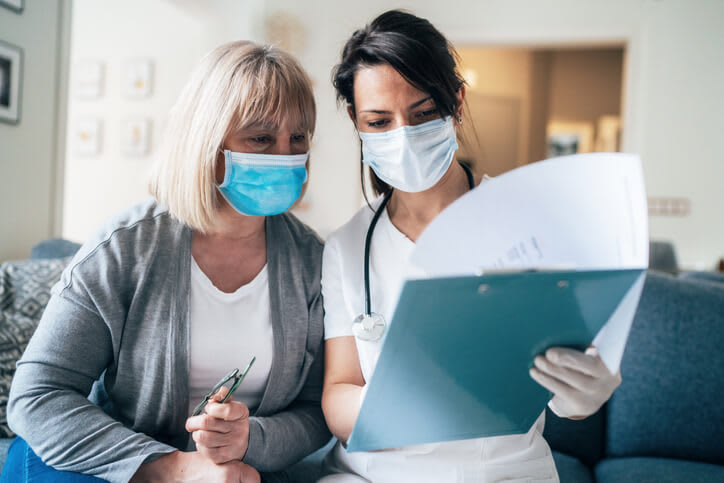Symptoms of Pneumonia in Older Adults
- What are the symptoms of pneumonia in older adults? Pneumonia is one of the leading causes of hospital visits for seniors. Learn about this dangerous condition.

Pneumonia is one of the most serious health problems seniors in the United States have to deal with. Caused by multiple respiratory ailments, pneumonia is the primary cause of over one million hospitalizations a year. More than 50,000 adults die from pneumonia each year. If you have the symptoms of pneumonia, it is important you get seen by a doctor without delay. These are the most common symptoms of pneumonia in seniors:
- Persistent cough, often with phlegm
- Chest pain that gets worse with coughing or normal breathing
- Shortness of breath
- Fatigue
- Nausea, vomiting and sometimes diarrhea
- Abnormally low body temperature
- Shaking, chills
- Confusion and other mental changes
What Is Pneumonia?
Pneumonia is a common complication of respiratory illness. It is caused by an inflammation of the delicate air sacs in the lungs, called pulmonary alveoli. This inflammation causes the tissues of the lung to swell and fill up with fluid or pus, which can quickly become serious as it blocks oxygen exchange in the lungs. The condition may be mild or severe, with seniors and people with compromised immune systems being the most at risk of hospitalization and death.
Common Causes of Pneumonia
Because pneumonia is a complication of respiratory illness, and not a germ itself, it has many causes. Almost any disease agent that attacks the lungs can cause pneumonia, but the most common causes are:
- Viruses, such as flu and coronaviruses
- Bacteria, including the bacteria that cause tuberculosis
- Fungi, when spores from almost any species are inhaled
- Chemicals that irritate the lungs, such as asbestos or fly ash
Viruses are the most common cause of pneumonia in older adults. This is one reason healthcare professionals recommend seniors whose immune systems can tolerate a flu shot get one every year. Mold, bacteria and fungal spores are in the air all the time, though these are mostly a risk for seniors with impaired immune systems.
Pneumonia and Seniors
Seniors are at special risk from pneumonia. Most of the deaths attributed to pneumonia occur among seniors, and treatment for the condition is complicated by many of the common disorders that come with advancing age.
How to Avoid Pneumonia and Its Complications
There is no single trick to avoid pneumonia, especially for seniors with existing medical conditions. There are, however, many things you can do to reduce your risk of developing pneumonia, and to limit the damage it does if you do get it.
The first, and arguably most productive, way to keep safe from pneumonia is to be generally healthy. Eating right, exercising daily and managing chronic conditions, such as diabetes, all have the effect of bolstering your immune system and making pneumonia less likely to strike when you get the flu or a cold.
Part of taking care of yourself is getting an annual flu shot. If your doctor believes your immune system is able to cope with the vaccine, you can help limit the spread of the single biggest cause of pneumonia among older adults, as well as reduce the risk that you will develop pneumonia yourself. Wearing a mask, practicing social distancing and avoiding close quarters with people who show the signs of a respiratory illness are also important steps that can prevent infections that lead to pneumonia.
It is also helpful to know the signs of pneumonia in seniors, and to act quickly if they develop. Many of the pneumonia cases that ultimately cause death start with relatively minor symptoms, then rapidly progress until treatment is less effective. While the majority of people who get pneumonia each year recover, do not delay medical help if you, your caregiver, family members, friends or the staff at your assisted living community notice the symptoms of this serious condition.
When to Seek Medical Help
Any case of pneumonia is potentially serious. The online health resource Mayo Clinic recommends all adults aged 65 and over seek medical attention at the first sign of pneumonia, if only as a precaution. Serious symptoms of pneumonia include:
- A fever that rises above 102 degrees Fahrenheit
- Persistent cough, especially with pain and/or pus
- Chest pain, which may be a sign of several major health problems that need a doctor’s attention
- Shortness of breath, which is virtually always grounds to seek immediate medical attention
- Dizziness, tunnel vision, confusion or other signs you might not be getting enough oxygen through your lungs
In addition to these serious symptoms, certain groups of people should always have the signs of pneumonia examined by a qualified medical professional:
- Children under 24 months of age
- Seniors
- People whose immune systems have been compromised, including people with HIV/AIDS, chemotherapy recipients and people on immunosuppressant therapy for a transplant
- Anyone living with an underlying medical condition, such as diabetes or cancer
The good news is that, while tens of thousands of Americans pass away from pneumonia each year, hundreds of thousands survive. Medical treatments for pneumonia work relatively well for overall healthy adults. Symptom recognition and early detection are both important for a successful outcome.